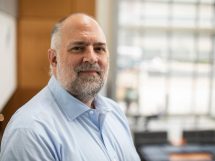Work focuses on how proteins that surround most organs contribute to growth and movement of cancer cells
BOWLING GREEN, Ky. (Oct. 15, 2013) — A WKU biology professor and his students are using a small fruit fly to find answers for a large question about how cancer cells migrate and grow.
Dr. Ajay Srivastava, assistant professor in WKU’s Department of Biology, began working with the Drosophila species of fruit fly during his post-doctoral research at Yale University and brought his genetics experience and research techniques to WKU in 2010.

“We study cancer because it’s a challenging issue,” said Dr. Srivastava, a native of India who earned his doctorate in Molecular Biology and Genetics in 2003 at the University of Alberta in Edmonton, Canada. “Our research may not cure cancer, but even if it slows cancer down, that is a major step forward.”
The fruit fly is used because Drosophila has well-defined genetics with the availability of sophisticated genetic tools, is easy to handle, has low costs to maintain and offers conservation of genes/pathways. “What you learn from Drosophila can be extrapolated to humans,” he said.
“My laboratory is broadly interested in understanding how cancer cells metastasize,” he said. “This process of cancer cells moving and growing, which we call metastasis, is the reason why cancer kills. Understanding more about this process allows for those who study and develop medicine to better identify targets that can be modified. This in turn increases the chances of developing effective medicines.”
Dr. Srivastava’s research work focuses on how the proteins that surround most organs contribute to the growth and movement of cancer cells.
“We are trying to understand the different aspects of how a tumor will grow,” he said.
In his lab at WKU’s Complex for Engineering and Biological Sciences, Dr. Srivastava and his students conduct genetic experiments on the small fruit fly as a model of tumor metastasis. “This allows me to test my theories on an intact organism,” he said. “The idea behind this is simple. We create flies that carry a foreign piece of a protein-specific gene that is part of the protein complex surrounding the organs.
“This protein complex is called basement membrane (BM). However in reality the process which we must follow to create such flies can be quite tricky and time consuming. Once the flies carrying the BM gene fragment are made then they can be utilized to study the effect of this piece of DNA on a living organism, the fly, and also how this could be used to see effects during tumor metastasis.”
Several of Dr. Srivastava’s students have used their work in his laboratory as a springboard to research and doctoral programs.
“These students benefit from the exposure to these powerful techniques in my lab,” he said.
During his first semester at WKU in 2010, Dr. Srivastava recruited two students from his genetics class – Sean Shannon and Jordan Olberding – to work in his laboratory.
“While Sean decided to pursue medicine at U of L after spending 18 months in my laboratory, Jordan decided to stay on and wanted to make the transgenic flies,” he said. “We decided this was a good project for her to pursue in the laboratory as part of her honors thesis.”

Over the next two to three years, Olberding set out to clone the gene fragment in a vehicle that would be later placed in the fly. This vehicle subsequently becomes part of the fly and so does the gene fragment in question, he said.
“This was a time-consuming process involving little successes and lots of failures,” Dr. Srivastava said. “Thanks to Jordan’s perseverance she was able to make the transgenic flies which my laboratory is now using to study the effects of this gene on tumor progression in a living organism. During this entire process Jordan learned first-hand the joy of doing science and she knew that what she was doing has the potential to unlock some of the mysteries associated with tumor migration.”
Olberding, who applied to several Ph.D. programs, began her doctoral program this fall at Yale University.
Two other students who worked in Dr. Srivastava’s lab also “appear to be doing well and ready to move onto the next level.” Kevin Colon Negron has joined the prestigious Ph.D. program in genetics and biochemistry at the University of California-San Francisco. After defending her master’s thesis, Gillian Jones accepted an internship in infectious diseases in Panama and plans to join a doctoral program upon completion of the internship.
In addition to teaching and research, Dr. Srivastava takes his role as a mentor seriously. But he notes that the mentoring and lab experiences would not be possible without support and funding from the Biology Department, WKU’s Office of Research’s internal funding from the Research and Creative Activities Program (RCAP), the Faculty-Undergraduate Student Engagement (FUSE) grants, and the AREA grant from the Kentucky Biomedical Research Infrastructure Network.
“What I’m trying to do is follow in the footsteps of the professor who kindled an interest toward genetics in me,” Dr. Srivastava said. “I want to motivate students and give something back.”




















Add Comment